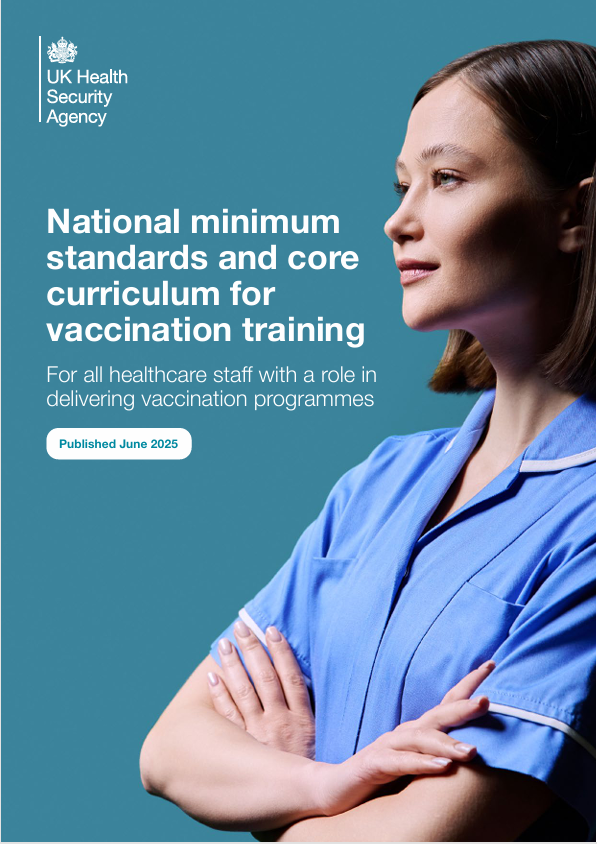
Training Requirements and Employer Responsibilities
Healthcare Support Workers (HCSW’s) are integral to the success of immunisation programmes, especially in meeting the growing demand for vaccines. However, their expanded responsibilities must align with proper training, competency, and governance. This blog focuses on the essential training requirements for HCSWs and the employer’s role in ensuring patient safety and compliance.
Training Requirements for HCSWs
Comprehensive training is critical to ensuring HCSW’s are equipped to administer vaccines safely and effectively. A key guiding document is the National minimum standards and core curriculum for vaccination training 2025
It is recommended that only experienced HCSWs take on a role in administering vaccines. It is expected that these HCSWs will have achieved education and training to Level Three of the Qualifications and Credit Framework (QCF) or equivalent and that they would be working at Level Three or above of the NHS Career Framework.

The curriculum provides a structured approach to immunisation training, ensuring that HCSWs acquire the necessary knowledge and practical skills to deliver these vaccines confidently and competently.
The new training standards state that, for HCSW’s to be involved in vaccine administration, they must be trained and competent and the following areas should be considered:
- there needs to be appropriate mechanisms in place for prescribing, delegation, accountability and supervision in order that vaccine administration is safe and effective
- all vaccinators must be confident, competent and well supported to ensure public confidence in vaccination is maintained: quality, safety and reputation are vitally important
- delegation of vaccination must be both appropriate and in the best interests of the provider organisation and, most importantly, of the patient.
- delegation of the vaccinator role to non-registered staff does not necessarily result in operational efficiencies. For example, it is outside the scope of practice of a HCSW to undertake a clinical assessment for vaccination, take informed consent or work to Patient Group Directions (PGDs). For this reason, they may be better employed in roles other than vaccine administration
The depth and breadth of knowledge and experience required means that it is not considered suitable for HCSWs to deliver injected vaccinations to infants and pre-school age children. It may also not be considered suitable for individuals with complex medical or vaccination histories (unless assessed by a RHCP as appropriate to do so) or individuals who require travel vaccination.
There are many other roles they can take on to increase capacity and maximise efficiency in the delivery of vaccine programmes, such as vaccine ordering or monitoring the cold chain.
Additional specific considerations for HCSW’s
- HCSWs, and the RHCPs delegating any aspects of vaccination to them, should be clear about their responsibilities, the limitations of the HCSW role and when they should seek help from a RHCP. The HCSW should refer to a RHCP if an individual requires more information to enable an informed decision about vaccination to be made.
- Following completion of training and assessment, HCSWs must continue to be supported and supervised by a registered and experienced healthcare professional who is available to provide advice and leadership where necessary.
- The HCSW must be able to identify the appropriate RHCP to whom the patient can be referred if they require more information to enable an informed decision about vaccination to be made.
- RHCPs delegating to HCSWs have a responsibility to ensure that the HCSW’s training is up to date and that their work is of the required standard.
Employer Responsibilities
Training is an essential requirement which should be included as a core element in vaccination contracts. The NHS England General practice vaccination and vaccination services: standards and core contractual requirements states that ‘all healthcare professionals involved in the administration of vaccines must have the necessary skills and training’.
Employers play a pivotal role in enabling HCSWs to take on expanded responsibilities.
Below are the key areas of responsibility:
1. Competency Assessment
Employers must:
- Ensure HCSWs complete immunisation training as per the UKHSA training standards
- Conduct competency assessments, with regular re-evaluations to maintain standards.
All new vaccinators should complete a competency assessment for formal evaluation and sign-off of their clinical competency. The UKHSA training standards provide a competency tool:


2. Governance and Policy
Organisations must develop and document clear policies, including:
- Which vaccines HCSWs are authorised to administer under a Patient Specific Direction.
- Supervision arrangements to ensure a registered practitioner is available on site for advice.
- Local governance protocols for safe vaccine administration.
3. Supervision and Support
Employers must guarantee that:
- A registered healthcare professional is on-site for supervision, guidance and support.
- HCSWs can escalate any concerns or questions to their supervisors.
- For medicines and prescribing advice the prescribing clinician should be available.
The following questions should be asked before the activity is delegated to the HCSW:
- Is delegation in the best interest of the patient
- Has a risk assessment been undertaken
- Has the HCSW been appropriately trained and assessed as competent to perform the role
- Does the HCSW consider themselves competent and confident to perform the role
- Is adequate support and supervision available on site
- Are robust protocols in place so that the HCSW is not required to make a stand-alone clinical judgement
4. Insurance and Legal Safeguards
Employers must:
- Provide indemnity insurance for HCSWs administering vaccines.
- Ensure compliance with regulatory standards and professional guidance (e.g., RCN, CQC).
5. Ongoing Professional Development
Invest in continuous learning opportunities for HCSWs, including:
- Annual refresher courses on immunisation updates.
- Access to resources on new vaccines or immunisation protocols.
Legal frameworks for administration of vaccines
The administration of Prescription only medicines (POM’s) which includes vaccines are subject to strict laws and governance.
Organisations have a legal duty of care and are responsible for ensuring a Medicines Policy is in place and that the staff they employ are properly trained and competent to undertake only those responsibilities specified in agreed job descriptions.
Can a HCSW give vaccines under a Patient Group Direction?
No: In any case involving administration of a medicine, an unregistered support worker may only administer under a PSD or National Protocol (Flu and Covid Vaccines) and may NOT work under a PGD.
HCSW administering vaccines should always be supervised by registered healthcare professional. Ensuring that any questions or issues that may arise during vaccine administration can be addressed promptly by practitioner with the appropriate clinical expertise.
Can a HCSW give vaccines under a Patient Specific Direction?
YES: The prescriber is responsible for the clinical assessment of the individual in advance and the decision to authorise the supply/administration of the medicine(s) in question.
The prescriber has a duty of care and is professionally and legally accountable for the care they provide including the delegation of any administration of medicines they prescribe. The prescriber must be satisfied that the person to whom the administration is delegated has the qualifications, experience, knowledge and skills to provide the care or treatment involved.
Delegated staff : A person who supplies or administers a medicine is accountable for their own practice and must be trained and competent to undertake such tasks. They must act according to their level of competence and in accordance with the directions of the prescriber.
Whilst any suitably trained and competent person may follow a PSD for administration, some organisations may extend or limit those who are authorised to administer medicines under a PSD within their local medicines policies and governance arrangements.
In conclusion
As the vaccination programme expands and roles of HCSW evolves it is important that employers and practitioners keep informed about the regulations and guidance and that HCSW’s only work within their professional scope of practice and sphere of competence.
Employers must adapt by providing additional training and robust governance to support HCSWs in expanded roles. They must ensure that training programmes align with the latest standards, governance frameworks are clear, and support systems are in place. By doing so, they not only enhance patient care but also empower their workforce to play a greater role in meeting public health demands.
Further Reading and Resources
NHS England » Summary of legal mechanisms for administering Covid-19 and influenza vaccines